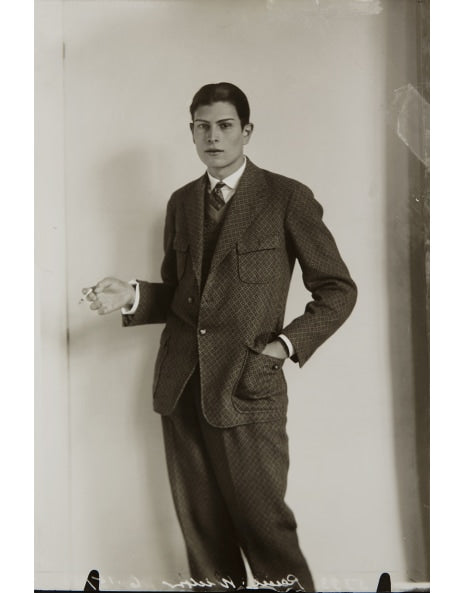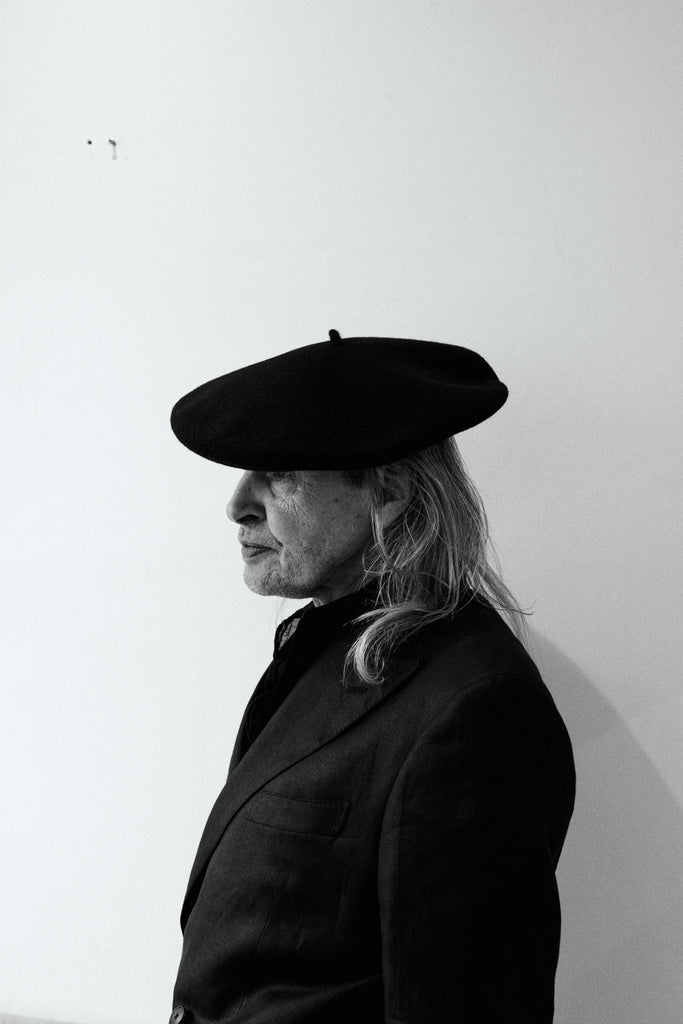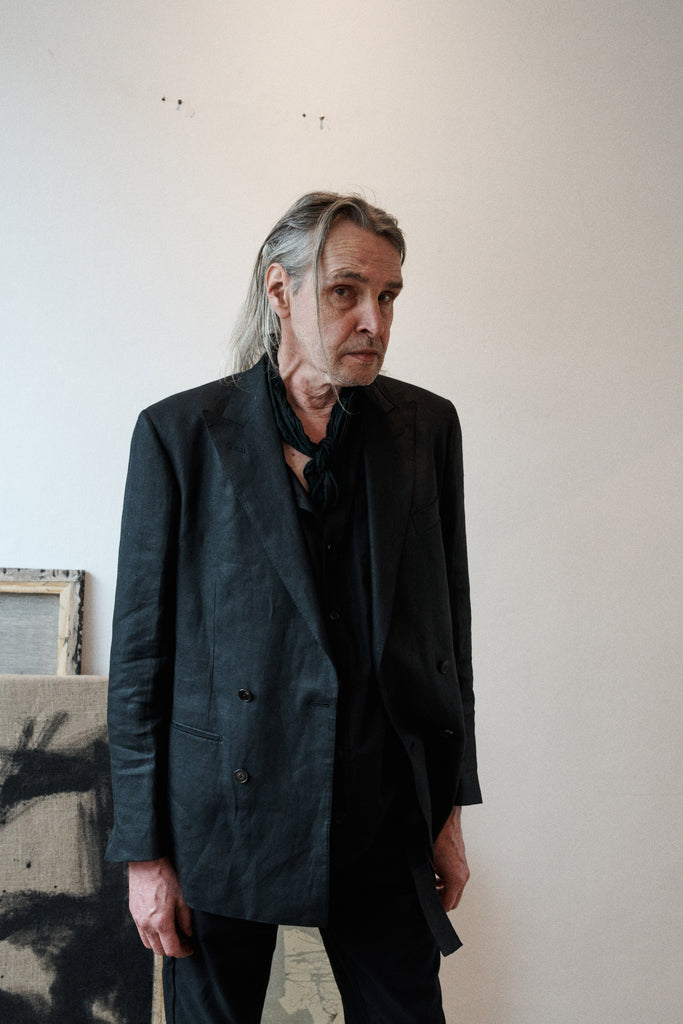Interview Maison Rose

Interview Maison Rose
In LUCENTEMENT PODCAST EP7, we chatted with Louis Renaud about his label Maison Rose for our latest podcast. Louis has caught our attention due to his way of producing garments locally and providing transparency on his suppliers. His vision on fashion, life and craftsmanship intrigued us to introduce him to you via this interview.
Louis Renaud and the start of Maison Rose
LCM: Where did you grow up and how did you get into this type of design/artisanal fashion?
Louis: I was born and raised in Munich, Bavaria, the south of Germany, to a French father and a German mother. Art and literature played a huge part in my life at an early age, as my dad was a writer and he used to work for theaters. The French part played a role, as I went to Paris often at a young age to visit my grandmother. Paris always caught my attention, the looks and the way that people dress. It played a role, but in a cultural way.
LCM: The meaning that a rose holds to someone is deeply personal and you named your label Maison Rose. Can you tell more about the Rose and what the symbolism of this rose means to you and your life?
Louis: The first idea was to name the brand after me, Louis Renaud. However, I wanted to have a more neutral name, and the rose played a huge role in my life due to my grandparents. My grandfather and grandmother took care of me a lot when I was younger. And the roseyard played a huge role in the family, my grandparents lost a lot in their life with regards to finances, but the roseyard was something they kept. They always brought it with them wherever they moved to. Since I was young, I can remember that my grandfather took a lot of care for the rose as it symbolizes the past life to him. This rose was the highlight of every spring and summer and it played a role in the relationship between me and my grandparents. I therefore named the label Maison Rose, as an honor to my grandparents.
LCM: We find it interesting to get to know people and how they became who they are. What, who or where do you find inspiration? What gets you going?
Louis: I take a lot of inspiration from the walks with my dogs in the mountains. I find it interesting how fabrics can work in rain for example, or how snow affects a traditional way of clothing, and the colors of the woods and stones, the greenish and grayish tones. But also for self-reflection, I often go to the woods and mountains. I also take a lot of inspiration from art, and the artist’s closet. I am always fascinated by the garments that old-aged artists are wearing, like Anselm Kiefer, but also photographs from August Sander inspire me.

LCM: We feel like your tumblr is a good representation of what’s on your mind as a designer. We see a lot of human emotion, poetry and anonymity. What’s the message you want to share across with your work?
Louis: It’s not a message that I am trying to spread across, but it’s rather a representation of my mood. What I like about tumblr is that you get references, so the sources are shared and the artists get the credit that they deserve. Tumblr is like a moodboard for me in different aspects, like quotes I resonate with, but I also discover photography and brands I didn’t know before. What I also like about tumblr is that nothing is censored, you get the raw images with nipples for example. You can experience the true craft of a photographer. It’s very open and they keep the sources. Artists should get their credit.

Design philosophy and inspiration
LCM: Your design philosophy and inspiration is based on Nature, Solitude and your grandfather's closet. What garments did you predominantly find in your grandfather's closet and how do you use this as base for your current work?
Louis: The beginning part with communicating about my grandfather's closet obviously came from the garments I found in my grandfather's closet. However, I find older people very inspiring, especially in France and Italy as they know how to dress. They have a certain respect for themselves, and for the person that produces the garment. That’s also why tailoring caught my attention lately. Moving back to my grandfather's closet, I found a lot of interesting shirting and pants with unique shapes in old photos of my grandfather. Like an old Levi’s trousers that was crafted in Israel with a shape I had never seen before in a Levi’s trousers. I saw my grandfather wearing it and it was completely out of my idea that those trousers were Levi’s. When digging more into this archive of photographs, I found pieces that I really liked and I tried recreating some of them with my own vision. I like the idea of taking something from a person I loved so much and translating it in today's world. This is where my interest in old people’s closets comes from.

LCM: You are one of the few designers that produces 90% of their garments locally in their own region. Some designers produce in their own country, but you produce in your region. Why did you decide to work with local producers in your region?
Louis: For me it's a natural process. When I started I produced 100% of my garments in Germany and tried to work with German made fabrics only. Since the pandemic, I had to move some of my production to Italy, but still the jackets and the blousons are made in Bavaria. I want to be near my suppliers and partners, as I want to meet and build a relationship with the people that are producing the garments. I feel better when I have a good relationship with the people that work with me, because I believe in synergy. It’s a better product if it’s made with love on both ends of the production chain.
LCM: We like how you mention where your fabrics are created and which fabric supplier they are from. As you may know, this industry is very secretive about their processes or providing information on where they source their fabrics. Why did you decide to go against the current and provide transparency on this?
Louis: In the same way that I am transparent with my emotions, I try to be as transparent about my products. I would have been happy if someone was guiding me at a younger age when I was interested in becoming a designer. And also I think that providing information is just good for the understanding of a price. For example, I almost only work with luxury weavers, like Dugdale, which is a British linen weaver using Irish linen. It's important to me to uphold certain quality standards, and I see no reason to hide this information. In the Avant-Garde industry, it bores that brands try to create a mysterious aura around their products and keep important aspects hidden. I'm not interested in that. I believe in honesty and transparency with my product, so there's no need for secrecy.

LCM: We used to name Artisanal fashion as Avant-Garde. Though, Artisanal fashion, real craftsmanship and the industry is seeing declines year on year. The pandemic definitely did a number on the industry. What are your thoughts on the current state of Artisanal Fashion?
Louis: I would say it bores me at this point, Avant-Garde fashion today has grown monotonous for me. Scarsticing, overlock all these things are now used for the look instead of the functionality. Also the washing of garments is roughly the same looking at every artisanal brand. If you were watching Avant-Garde some years ago, you would still see the same elements in the washing. I got bored of it, and found a newfound appreciation for the art of tailoring. I got more interested in Geoffrey B Small, his philosophy of hand made tailoring and the construction. If you translate what Avant-Garde originally in France means, which is before the messes, I think we get back to the construction and way of creating garments from a century ago. Which is currently before the messes. The way Skelton, Paul Harnden and Geoffrey are working is very oldschool and I think it’s good that those designers are still working the natural, human made way.
Explore more
If you want to know more about Louis Renaud, please listen to our extensive podcast with him here or follow him on Instagram.




